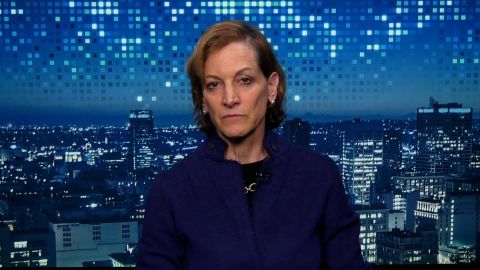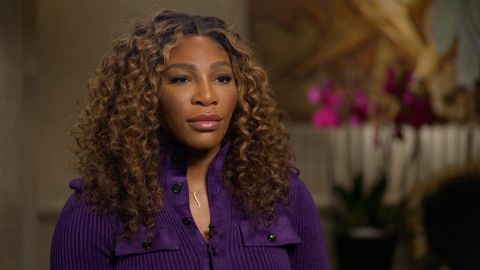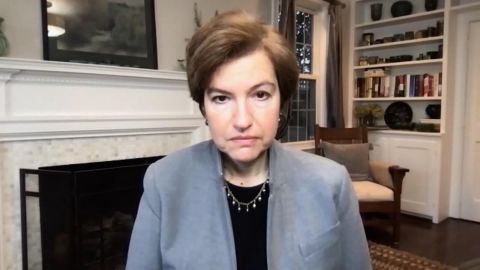Read Transcript EXPAND
CHRISTIANE AMANPOUR: And our next guest says the President Biden must rally not only a divided America, but the whole world, against Putin’s aggression. Susan Glasser is a writer for “The New Yorker.” And she was Moscow bureau chief for “The Washington Post.” And she’s joining Michel Martin to discuss how the U.S. president should respond to Putin’s war.
(BEGIN VIDEOTAPE)
MICHEL MARTIN, INTERNATIONAL CORRESPONDENT: Thanks, Christiane. Susan Glasser, thank you so much for joining us today.
SUSAN GLASSER, CNN GLOBAL AFFAIRS ANALYST: Thank you for being — for having me today.
MARTIN: You have such a deep expertise in the region and in the subject. But I want to start with the U.S. perspective. Do you feel that the strategy that the administration has laid out so far will be impactful? I mean, there’s been an emphasis, of course, as I think people know by now, on economic sanctions. There’s been a lot of certainly tough rhetoric. There’s been a lot of consultation allies. And there’s been the delivery of, or at least the promise to deliver sort of lethal weaponry to Ukraine, however they’re going to get it there at this point. But do you see these measures having an impact?
GLASSER: So, yes, first of all, a dramatic impact. Basically, what the U.S. and its allies have done is to declare economic war on Russia. And we are seeing an extraordinary consequence of this. This is the kind of thing that people in Washington, kind of policy wonks at the Treasury Department have said for years, well, yes, there’s a lot of bigger things we could do. But that would cause catastrophic consequences in Russia. And that’s why we haven’t done them. And we’re seeing that this week. It is — those are some big guns economically. And Putin has never really been someone who focuses on kind of economic tradecraft. And I think maybe even he is stunned at the extent to which the United States and its allies have basically cut Russia off from the world right now. So what effect will that have on Russian society? In the short term, clearly, unfortunately, it’s causing a new Iron Curtain to fall, right? It is an enormous amount of domestic repression at home is going to be Putin’s response to this on the part of Biden, number one. I would say that where the concern is right now and where you see President Biden, I think, trying to be a voice of restraint, to a certain extent, is there’s this enormous risk that Putin escalates further, that the more he backs himself into a corner — in fact, his history and methods suggested that he may well escalate his desire, clearly stated, to reassemble pieces of the old Soviet empire. And so that’s why you had President Biden from the beginning saying, we’re not going to send U.S. troops to fight in this conflict, but — we do not want World War III. You see a lot of resistance to calls for, say, a no-fly zone. And so, to me, that is kind of the most anxiety-producing and uncertain thing, is, how much more escalation will you see from Western allies, because people are so horrified, understandably, at what’s happening?
MARTIN: How do you read whether the administration really has support, bipartisan support, for the moves that he’s making here?
GLASSER: Yes, I think that’s an excellent question. I do believe there is strong bipartisan support for Ukraine. And there has been, by the way, for a long time, even through the previous Trump administration. And so the president has proposed a big new — I think $10 billion was the number being thrown around — aid package for Ukraine that would include both military and humanitarian aid. I expect that there would be overwhelming bipartisan support in both the House and the Senate once that does come to the floor, presumably pretty quickly. However, part of the kind of public theatrics that you saw the other night at the State of the Union, I do, think is misleading. The Republicans really are a bit panicky right now, because, in the lead-up to the war, what you saw really was the emergence of a shockingly large pro-Putin wing of the Republican Party led by the former president himself, Donald Trump, who, as everybody knows at this point, right, has been sort of praising Vladimir Putin for years, sucking up to him, and concurrently adopting his view of Ukraine. I think that it’s sort of been forgotten in all the chaos and crises, understandably, of the last few years, but Donald Trump was impeached because he tried to blackmail the now international hero president, Volodymyr Zelensky, by with — literally by withholding the weapons that he needed to fight off this very kind of Russian invasion scenario. And he called President Putin’s moves in Ukraine genius literally days before the missiles started flying. And so the Republicans, seeing this enormous groundswell of support, are panicking over the idea that the leader of their party, whom they refuse to disavow, has clearly got this big faction of people. So I think that’s why you saw a real urgency on their part to make sure they were applauding that part of Biden’s speech and standing up. We will see, when the dust settles from this horrible conflict, how much of that pro-Putin faction exists or whether the war actually wipes that away.
MARTIN: How impactful do you think was President Trump’s, I don’t know how else to put it, sort of kowtowing to Putin over these last four year?
GLASSER: What’s remarkable and really regrettable is that it’s — this is not just a few comments about Putin being a genius a couple of weeks ago. This is years’ worth of Trump and his allies in the United States, and, by the way, in parts of Europe as well, far right nationalists, praising Vladimir Putin, seeing him as this sort of avatar of a different political course,. Republican voters have followed Trump, to a kind of shocking degree, not all of them, but, again, there’s a significant faction they have. And, to me, the indicator that really just hits in the gut is that Americans are so divided. Polls have consistently shown that Republican voters — Putin is unpopular with Republicans and Democrats in the U.S. so let’s be clear about that. But he is far less unpopular with Republican voters than Joe Biden, the president of their own country, and like, not by a little bit, by like 20 points. And so that’s a shocking indicator. But what I would say is that it’s still hard for me as well to understand, as an American, how there could be a large segment of our society that would be supporting Putin. One, they may not understand fully the nature of Putin’s dictatorial regime, the absolutely suffocating world of corruption and control that he’s reimposed inside Russia. So that’s not necessarily something that you would think about every day if you’re an American. Number two, look at our society. I would recommend to read about the period before the United States entered the Second World War, and look at the history of the America First movement. Look at what a large segment of American society was, actually following Charles Lindbergh, not just resisting entry to the war, but actually saying admiring things about Hitler’s strength and the like. That’s a dangerous analogy to make. So I’m not saying it’s that the exact same thing, but, politically, that dynamic resonates, I would say.
MARTIN: Let’s talk a bit more, though, about how we got to this point and what the U.S. role has been in getting to this point. I mean, you have written quite often about the fact that the U.S. has misread Putin and his intentions for years, that, for some reason, American administrations, successive American administrations have either — well, you tell me. Did they not take him seriously? Did they misread his intentions? Can you just talk a little bit about that?
GLASSER: Yes, I think that’s a great question. In a way, Americans historically have tended to layer on some of their own ideas and perceptions onto Russia and onto Vladimir Putin for two decades. And I was stationed there in Moscow at the beginning, the first four years really of Putin’s tenure as a leader. And for much of that time, there was a real debate in the United States over those who saw him, as former Vice President Dick Cheney, actually very clear-eyed, said to a colleague right when he ascended. He said: I look at that guy, and I see KGB, KGB, KGB. And you know what? He was right. But there was also President George W. Bush, who looked into Putin’s eyes and saw someone who he could do business, who was a modern, different kind of leader. And so there was a willful desire at times to see the Putin we wanted to see, rather than the Putin who told us in 2005, right — 2005, Vladimir Putin said, the breakup of the Soviet Union was the greatest geopolitical catastrophe of the 20th century. You know what? That had nothing to do with NATO expansion for Ukraine, which, by the way, wasn’t even a topic of conversation until years later, right? And, again, it just — it was unthinkable to many people that we would end up where we are. And, of course, that’s true of all wars. But, in this case, there was example after example, and not just the Bush administration. The Obama administration, I think, really misread the situation with Putin, because he had just militarily marched into Georgia next door in 2008. And yet, months later, the Obama administration came in and wanted to have a reset and embraced a kind of fantasy version of this, in which there was going to be a reformer, Dmitry Medvedev, temporarily in the president’s position, and they were going to do business with him, and there was going to be a different path forward. But the lesson that Vladimir Putin got from that was, hey, I had a war of aggression against a neighbor, and, really, there was no long-term damage to me. And, unfortunately again, there’s years worth of things like this.
MARTIN: How would you describe President Trump’s relationship with Putin? What was his sort of assessment of him? Do you have a theory about what that was about and what animated that?
GLASSER: It was very clear that there was a Trump administration policy that wasn’t all that different from what you might have seen from any administration. And so, we did continue the sanctions on Russia that existed after the 2014 takeover of Crimea. We did provide defensive weapons like the javelins to Ukraine. That was actually over Trump’s objection. And that’s the thing, Trump did not support his own administration’s policy. He had a very hostile view with NATO, and his aids and advisories repeatedly had to talk him out of actually pulling out entirely. I don’t think people understand that. It wasn’t just rhetoric from Donald Trump about NATO being obsolete. He came very, very, very close including in the summer of 2018, he explicitly told his then national security adviser, John Bolton, his then White House chief of staff, John Kelly, that he was going to pull out of NATO, and they made a desperate last-ditch effort to stop him from doing that. So, there were many advisers, including Bolton who stated publicly that had Trump had a second term in office that he was going to proceed with blowing up the NATO alliance. So, that’s number one. Those are facts. Number two, Trump not only embraced Putin as a strong man and a strong leader and, you know, a kind of figure of veneration and admiration, he — and refused to take many steps that his advisers urged him to take regarding Putin, but he also adopted Putin’s view of Ukraine. The record, the sworn testimony in the impeachment trial was very clear that Trump did not believe that Ukraine was — he called it consistently a corrupt country that doesn’t support me. He adopted Putin’s view that it was totally fine for Putin to have illegally annexed Crimea because he said, well, you know, those people there, I don’t think they wanted to be in Ukraine anyways. And so, he would amplify the Russian need disinformation, conspiracy theory that it was not Russia, but Ukraine that actually interviewed in the U.S. 2016 election, which was always an absurd and untrue conspiracy theory. So, the record, again, is absolutely clear. It is not ambiguous. It is not hard to figure this out. It’s not that they’re forgetting. It’s that they don’t want you to remember.
MARTIN: You wrote a book about Former Secretary of State James Baker. He had a desire as the Soviet Union was collapsing to get a handle on the nuclear weapons scattered throughout the Soviet states. Why did he want to do that? Why did he think that was important? And what’s the relevance of that to today’s moment?
GLASSER: Well, that’s right. So, a big part of the Soviet nuclear arsenal was stationed in Ukraine when the Soviet Union unexpectedly collapsed. And so, it became a priority both of the George H.W. Bush administration with Jim Baker and then, the subsequent Clinton administration to make sure that there was really only one nuclear power that they were dealing with, and this was the enormous subject of negotiations. It was seen as crucial to the security of the world going forward. It takes enormous resources, of course, to maintain a nuclear arsenal. You don’t want to proliferate the number of powers you have. It was a real huge priority, and seen as a great success of American diplomacy that we were able to negotiate, you know, essentially the return of those weapons and Russia being the only successor, nuclear state. In exchange for that, there was the Budapest Memorandum in which Russia agreed to guarantee the sovereignty and independence of those states that gave up the weapons including Ukraine. So, Russia is illegally violating a treaty itself committed to. And, of course, for Ukrainians, it feels like a double betrayal, right? They agreed to do the right thing for world security, gave up their nuclear weapons, and here they are, if they had nuclear weapons, Russia probably wouldn’t be invading them, right? And so, it’s a tragedy, you know, for Ukraine. It’s a tragedy for the international system. But one other point that I’ve been thinking a lot when it comes to Jim Baker and the end of the Cold War, he and President George H.W. Bush were often criticized here in the U.S. for moving too slowly, for exercising too much restraint. When it became clear that, you know, what Reagan called the evil empire was unraveling, Americans, just like there are today, actually, you know, cheering on Ukrainians and hoping against hope that they would succeed. At that time, Americans were thrilled at, you know, this sort of eruption of freedom and democracy behind the iron curtain, and they wanted Bush and Baker to do more, more, more. And Baker and Bush were very concerned not to alienate the Soviet superpower when it had all those nuclear weapons and could destroy the world. And so, that tension really — there’s an echo of that today, although, of course, we’re seeing that tragically the history reversed itself.
MARTIN: Did that memorandum commit the West to certain obligations in exchange for the Ukrainians giving up their nuclear weapons, and what’s the relevance of that to the current argument about what the U.S. and its allies should be doing here?
GLASSER: Yes. Absolutely. It meant that we were guarantors as well as Russia to the independence and security of Ukraine. And, you know, so, clearly, we’ve learned that Russia does not keep its word. Clearly, we’ve learned that it is willing to rip up an international agreement, which it signed apparently not in good faith. You know, but the question is also on the U.S. We talk about an international system. We remain the world’s strongest superpower, but if we’re unwilling to defend that system when its core principles are being broken, of course, that is an enormous blow to U.S. power and prestige as well. You’re absolutely right about that. And so, we have, in effect, chosen among terrible competing demands, and what we’ve chosen is at the moment to say our commitment to NATO is sacrosanct, and you know, if you move one inch into NATO, Vladimir Putin, you know, our Article 5 commitment to defend all of those members will be met. But we’ve chosen that at the expense of the broader principles of international law and sovereignty that we also are committed to.
MARTIN: Susan Glasser, thank you so much for talking with us.
GLASSER: Thank you.
About This Episode EXPAND
“Stop Russian nuclear terrorism.” These were the startling words of Ukrainian President Zelensky after Russian forces fired on the Zaporizhzhia nuclear power plant. What would a Russian victory look like? President Biden must rally not only a divided America, but also the world, against Putin’s aggression. Serena Williams on her her extraordinary life and career chronicled in “King Richard.”
LEARN MORE



